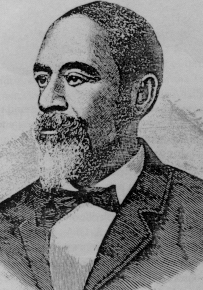 Randall Bartholomew
Vandavall was born a slave on March 23, 1832, near Neely's Bend, about
ten miles above Nashville on the Cumberland River. He was one of eleven
children born to slaves Sylvonia and Lewis. T h e mother came from Virginia
to Middle Tennessee as a baby; the father was a coachman. When the mother
died, the owner hired the large family to local employers. Randall's father
was no longer able to make his weekly visits to see his family.
Randall Bartholomew
Vandavall was born a slave on March 23, 1832, near Neely's Bend, about
ten miles above Nashville on the Cumberland River. He was one of eleven
children born to slaves Sylvonia and Lewis. T h e mother came from Virginia
to Middle Tennessee as a baby; the father was a coachman. When the mother
died, the owner hired the large family to local employers. Randall's father
was no longer able to make his weekly visits to see his family.
Young Randall's new employer forced him to sleep on the ground. Later he slept in the white family's house and attended school with the master's sons. Now living in Nashville, at age sixteen Randall joined the First Colored Baptist Mission and later professed to be a preacher. He became a slave to two more owners and worked on a railroad. After returning to Nashville from the railroad construction project, Randall became a "quasi- independent slave" by paying his owner $200 per year from his wages as a drayman (taxi driver). He married Martha Nicholson, a slave whose master also allowed her to hire out to others. These kinds of arrangements were common in a boom town like antebellum Nashville, where twenty-two percent of the blacks were free persons and a quarter of the slaves were hired out. Just before the Civil War began, Randall arranged for a friendly white lawyer to obtain an $1800 loan to purchase his and Martha's freedom.
Vandavall was elected pastor of the "African Mission," a black congregation established in January of 1862 by the white Spring Street (Central) Baptist Church. The Union army arrived in the city in February and forced the Spring Street Church's pastor and Confederate-sympathizing members to flee, thereby causing the "African Mission" to disintegrate before it could firmly establish itself as a black church.
Two years later, the Spring Street Baptist Church reopened with a white minister from the North. Vandavall's fortunes rose again in 1864 when the new minister, Daniel W. Phillips, recruited him to help form the "Baptist College" to train black preachers. In 1866, this school became the Nashville Normal and Theological Institution (Roger Williams University) on Sixteenth Avenue, North, where Phillips served as president and Vandavall became one of the trustees.
In 1866, Vandavall formed the Second Colored Baptist Church ("Vandavall's Baptist Church," later named First Baptist Church of East Nashville). The congregation worshipped in Vandavall's home on Berry and Second streets in Edgefield before moving to the old Union army barracks on Mark and Stevens streets and later to McClure's Hall on Woodland between Second and Third streets.
Vandavall rose to prominence in black Nashville. Edgefield's black public school at Wetmore and Spring streets was named in his honor in 1880, and Roger Williams University awarded him an honorary Doctor of Divinity degree in 1886. He served on the Negro Committee of the Tennessee Centennial Exposition in 1897. The Reverend Vandavall's name sometimes appears in historical sources as "Venable, Vandervill, Vandervall, and Vandevall." He was pastor of the First Baptist Church of East Nashville until his death in 1898.